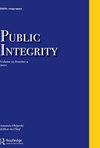Reel Philanthropy: Lessons in Love Using Autoethnographic Filmmaking in Public Affairs Education
IF 1.3
Q3 PUBLIC ADMINISTRATION
引用次数: 0
Abstract
AbstractLove is at the heart of the mission of public service. Nevertheless, the field of public administration has drifted away from this core principle. In this article, we propose an approach to integrating philanthropy education into the public affairs curriculum that could realign public service with its mission to love. We identify, however, a significant challenge that persists. That is, traditional philanthropic education often emphasizes “elite philanthropy” tied to unequal wealth distribution (what we refer to here as philanthropy’s hegemonic archetype). Thus, traditional philanthropic education, although conceptually rooted in love, is generally far removed from notions of love. To overcome this challenge, we focus on the use of experiential philanthropy as a means to empower students to engage in meaningful philanthropic acts. However, we acknowledge that the approach may not completely transform students due to, what studies have found to be, its oftentimes short-term impact. We, therefore, explore how combining experiential philanthropy with methods of auto-inquiry, specifically autoethnographic filmmaking, can liberate philanthropy from its “elite” image and sustain students’ genuine commitment to love—and ultimately to public service.Keywords: Experiential philanthropyfilmmakingautoethnographycritical thinkingpedagogy Disclosure statementNo potential conflict of interest was reported by the author(s).Notes1 Self-reflection focuses on one’s thoughts, feelings, and actions, whereas self-reflexivity is a way of being that involves noticing patterns in one’s experience. According to Nagata (Citation2004), “self-reflexivity can be understood as having an ongoing conversation with one’s whole self about what one is experiencing as one is experiencing it. To be self-reflexive is to engage in this meta-level of feeling and thought while being in the moment” (p. 141).2 It should be noted that inevitably one must rely on tenets of autobiography in order to conduct autoethnography.卷轴慈善:在公共事务教育中使用自我民族志电影制作的爱的课程
【摘要】爱心是公共服务的核心使命。然而,公共行政领域已经偏离了这一核心原则。在本文中,我们提出了一种将慈善教育融入公共事务课程的方法,可以重新调整公共服务与爱的使命。然而,我们发现了一个持续存在的重大挑战。也就是说,传统的慈善教育往往强调与财富分配不平等(我们在这里称之为慈善的霸权原型)相关的“精英慈善”。因此,传统的慈善教育虽然在概念上植根于爱,但通常与爱的概念相去甚远。为了克服这一挑战,我们专注于利用体验式慈善作为一种手段,使学生能够参与有意义的慈善行为。然而,我们承认,这种方法可能不会完全改变学生,因为研究发现,它往往是短期的影响。因此,我们将探索如何将体验式慈善与自动查询方法相结合,特别是自我民族志电影制作,从而将慈善事业从其“精英”形象中解放出来,并维持学生对爱的真正承诺,并最终致力于公共服务。关键词:体验式慈善电影制作自我民族志批判性思维教育学披露声明作者未发现潜在利益冲突注1自我反省集中于一个人的思想、感觉和行为,而自我反思是一种存在方式,涉及到注意到自己经历中的模式。根据Nagata (Citation2004)的说法,“自我反思可以被理解为与一个人的整个自我就一个人正在经历的事情进行持续的对话。”自我反思就是在当下的时候参与这种感觉和思想的元层面”(第141页)应该指出的是,一个人不可避免地必须依靠自传的原则来进行自我民族志。
本文章由计算机程序翻译,如有差异,请以英文原文为准。
求助全文
约1分钟内获得全文
求助全文

 求助内容:
求助内容: 应助结果提醒方式:
应助结果提醒方式:


